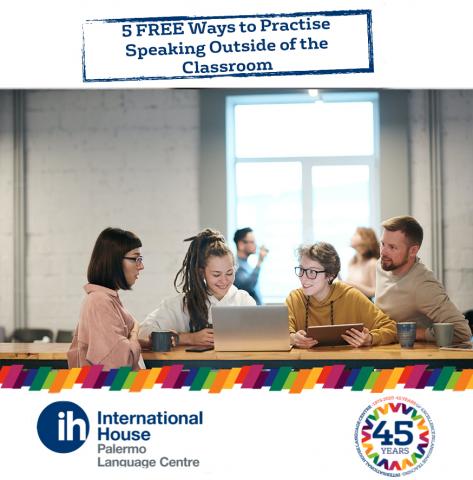
The first skill that each student wants to learn is speaking. Therefore, this is the skill that should be practised the most.
The question that will then follow from a student is “how can I practise outside the lesson if I don’t have anyone to speak with?”
There are in fact many ways to practise, so let’s have a look at some of them.
1. Find a language partnerThere are many free sites where you can do this. And the best thing is that you can speak to each other over the internet so you don’t even need to be in the same place to do it!
Don’t expect to find the perfect language partner at your first attempt, as you can sometimes find someone who maybe you don’t get on with so well, but don’t give up as this can be a hugely valuable tool.
This is when you listen to something and repeat what the speaker says. The best thing to do is listen to something like a podcast and repeat what the speaker says out loud. This is a brilliant technique and it will help you a lot with pronunciation and intonation.
This may sound easy, but it’s not. You will get tired very quickly, so the best thing to do is just try to repeat a small section of a recording, even 30 seconds. Try to imitate the speaker as best as you can; if you have the transcript to what the speaker is saying, it will be easier.
If you want to be a REALLY good student, record yourself when you do it and compare what you say to the speaker.
This sounds crazy, but you will be amazed at how many polyglots have implemented this technique to learn many languages. If you are in public, it’s probably best to talk in your head, or people will think you’re crazy! ;)
Another great thing to do is to try and talk about your day and recount stories of things that happened to you. By doing this, you will find occasions when you don’t know a specific word, so it gives you the perfect opportunity to go and look up the meaning and learn new vocabulary.
This is so simple, but so effective. The reason is works is because your mouth will be producing grammatically correct sentences which will slowly start moving into your brain. This will enable you to understand grammar just because it ‘sounds right’ instead of trying to recall grammar rules in your head.
To speak a foreign language, your mouth has to produce sounds that are unnatural for it. By reading aloud, you will be practising these sounds regularly and therefore you will find it easier when speaking, as your mouth will have had much more practising creating these strange sounds.
If you don’t like reading... try singing and sing some of your favourite songs!
Speaking to your friends that speak your native language in English is strange. It’s a great way to practise, but it’s strange and can be embarrassing. If you don’t find this situation difficult, then speak to your friends in English, as this is a great idea.
However, if it is something you’re not comfortable with, send each other voice messages. Doing it like this can be very funny and avoids all the embarrassing bits, as you will not be in the same room when you do it.
Obviously you don’t need to use all of these methods (although there would be nothing wrong with doing that), try all of them and see what you like best.
Remember, none of these methods are easy and will require extra effort from you. All of them will feel strange at the beginning, but don’t give up and keep with it. If you want a new result (improve your speaking), you need a new action! ;)
